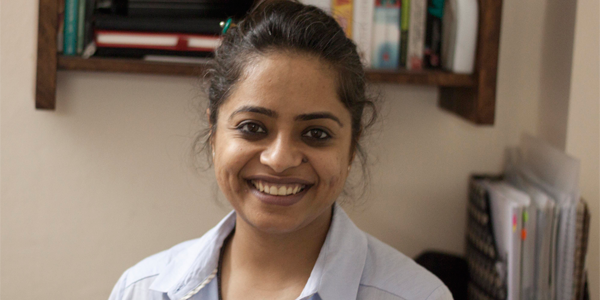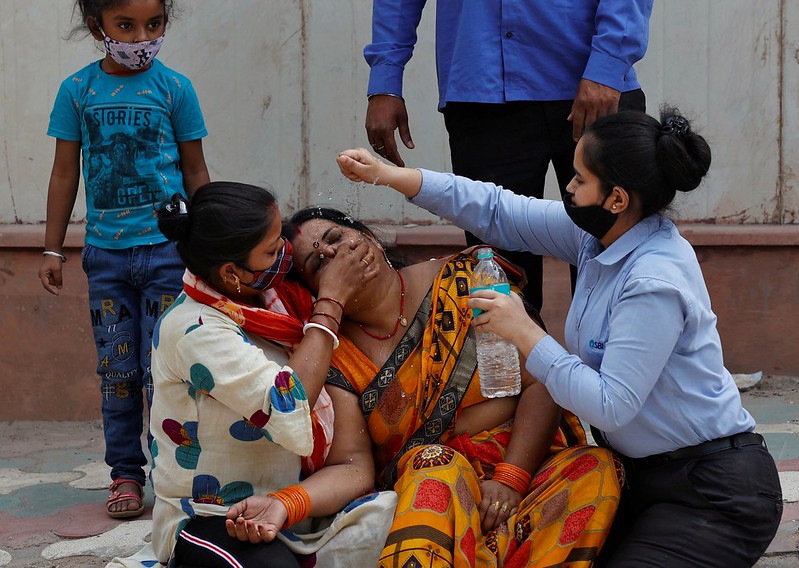Originally, both Safdar Ali and Durba Gogia pursued careers and handsome salaries. But after several years in the corporate world, they gravitated toward the social development sector and ultimately to CCP. Safdar and Durba brought with them ample experience in mass media and advertising that have helped to burnish CCP’s reputation as a leader in social and behavior change communication (SBCC).
For two years, Safdar and Durba have been deeply involved in Project Ujjwal, a family planning initiative designed to reduce maternal deaths from unwanted pregnancies by increasing use of family planning (FP) methods, improving birth spacing practices and preventing unsafe abortions in Bihar and Odisha.
Safdar is state assistant BCC manager for Project Ujjwal. Durba serves as the project’s national SBCC program officer.
When Safdar Ali joined CCP’s Urban Health Initiative (UHI) in the northern Indian city of Allahabad, he quickly turned a shortcoming into an advantage. Without available funding for a mass media campaign to address mistaken beliefs about family planning, “We started reaching out to local cable stations,” says Safdar, UHI’s technical officer for communication.
“Namaste Doctor” soon hit the cable airways at no cost to UHI. It didn’t take long before thousands of women were tuning in to the live call-in show on which doctors fielded questions from callers and debunked myths that hindered family planning decisions.
“Namaste Doctor” is just one example of Safdar’s unerring instinct for finding untapped resources to solve problems. And in a way, coming to CCP solved a problem Safdar, himself, had wrestled with since college.
With a background in mass communication, Safdar first aimed for a career in mainstream journalism. After graduate programs in human rights and law, however, he realized that his talents were more suited to eliminating caste discrimination and dire poverty. He left journalism.
Working for Dalit human rights and a development agency in disaster management led Safdar to CCP in 2010. Here, “I discovered that this was where I could apply the theories of communication I had studied in my courses,” he says.
Currently, Safdar is based in Bihar where he runs Ujjwal’s mHealth initiative and supplies Secure Digital (SD) cards loaded with family planning films to the project’s frontline workers. Safdar’s negotiating skills have helped persuade the Bihar state government to screen family planning films produced by the project. He also creates video stories featuring frontline workers.
On weekends, Safdar often travels back to Raksia, his village in the Sitamarhi district of Bihar, where he is helping to put textbooks in the hands of students from poor households.“This idea came in mind when I visited my village and the daughter of one of my relatives who is very poor left her studies because she didn’t have money to purchase textbooks.”
Safdar found a sustainable solution that would not only help his relative, but many others in the same position. “I asked three students,‘Why don’t you give your used books to other people to share?’”
Those books became the foundation for a small lending library Safdar is helping to establish. Rather than pay for his relative’s books, he says, “Why not create a mechanism so she and others can avail themselves of books free of charge?”
After a discussion about family planning with a group of women in Orissa, a participant with a lovely smile asked Durba Gogia a question: “Is it true that abortions are harmful?’” The woman, who was “visibly weak,” revealed that she had had four abortions.
For Durba, the woman’s story underscored Orissa’s unacceptably high abortion rate. But the story didn’t end there. Later, Durba learned that the woman, encouraged by their conversation, went on to adopt a safe method of birth control.
Although the group discussion “was not aimed at inspiring women to adopt contraception; but was just another routine field visit, I unintentionally ended up affecting somebody’s life,” she says. “That story still stays with me. It’s a constant reminder of the kind of responsibility this job entails.”
Durba’s own story is inspiring as well. Before coming to the development sector, she created advertising campaigns for various top brands. “At the same time, I was yearning to find greater meaning and significance in my work,” she says.
Being an English literature major in college gave Durba a discerning perspective towards India’s “social divides and gender issues.” She had long recognized the disparities that divided her country. At the same time, “I had a lot of pressure to pursue a career,” Durba says.
She shifted to a specialized unit devoted to NGOs within the advertising agency where she was employed. Here, her clients included UNICEF and the Indian government. Still, as she moved forward in her career, Durba sensed that she was just scratching the surface. She remembers telling a friend over a cup of coffee that she wanted to be more in the thick of social development work. Her friend responded, “If you really do get affected by these things, why not get involved in the work?”
Two years ago, Durba left the corporate advertising world to join CCP. “CCP means so much more than ‘health communication,’” she says. “The people I have met during my travels in Bihar and Orissa, in state offices and in community interaction have helped me evolve on a personal and professional level.”
Durba’s SBCC learning curve has been swift. “I’ve always learnt a lot more by doing and engaging with people.” She applies that strategy to her CCP work, striving to understand the social environment of the communities where she works and how to forge SBCC messages that resonate with those communities.
Encounters in the field continue to ground Durba in the meaning of her work. “Even when you are working towards social development, you sometimes tend to focus more on the job at hand, the deadlines and deliverables. You momentarily lose sight of the bigger picture,” she says. But then, the woman in Orissa and others come to mind and, “you remember why you’re here and stay true to that.”






